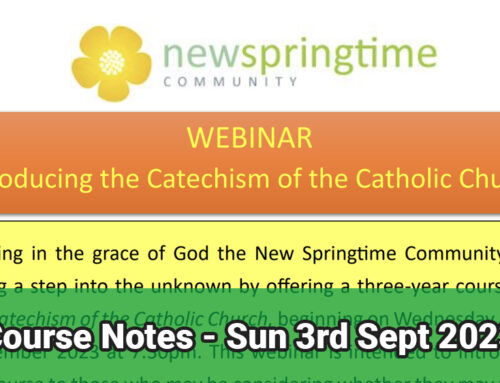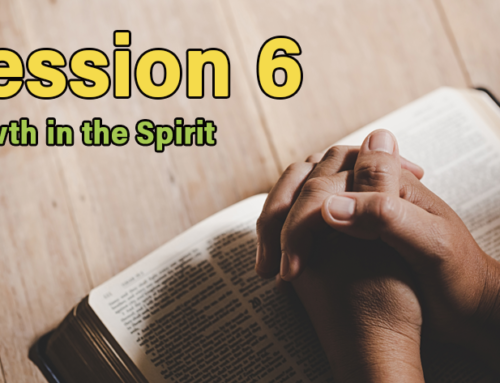Lectio Davina – Course Notes – Monday 4th September 2023
To download Lectio Davina course notes for 4th Sept 2023, please click here
If one Christian sins against another, the offended party, imitating the good shepherd who goes after the lost sheep, should first seek reconciliation in private by bringing up the fault cf. Lev I9:I7, “You shall not hate your brother in your heart, but you shall reason frankly with your neighbor, lest you incur sin because of him” which is alluded to in v. I5. If this attempt fails, the offended should next seek the aid of another, maybe two, cf. Deut I9:I5,
“One witness is not enough to convict a man accused of any crime or offense he may have committed. A matter must be established by the testimony of two or three witnesses,” and try again. If that likewise does not produce results, the matter is to be brought to the whole community. If, after that, a sinner remains recalcitrant, he or she must be regarded as outside the community, i.e., excommunicated. In modern Catholicism, the excommunicated have no share in indulgences, in public prayers, or masses, but the faithful should pray for them (cf. CCC # 1463, 2272). The community’s decision then has the authority of heaven itself (vv. I8-20), for its prayer is in effect Jesus’ prayer, and his prayer cannot but be answered (v. 20).
The instructions to correct another have a long history in Jewish literature. The source key text is Lev I9:I5-I8, which enjoins not hating others but reproving them (cf. Sir I9:I3-
20:2). In the Dead Sea scrolls Lev I9:I5-I8 lies behind the recommended formal procedure: one first takes a complaint to the individual against whom it is directed; if this does not have the intended effect, one then goes before the community.
Given their context in this passage about resolving conflict in the community verses 9 & 19 should not be understood as a promise regarding any prayer on which two or three believers agree (v. 20). While Scripture is rich in promises that prayer will be answered, if this passage deals with prayer at all, it is restricted by the context and by the phrase “about anything,” which should here be rendered “about any judicial matter.” Speaking for myself, I’d have to say that up to now I have always misunderstood the meaning and import of our Lord’s words. It is a good example of how important it is to get inside the mind and teaching of the inspired author .
Pope Francis pointed out in par. 227 of The Joy of the Gospel, that there are good and bad ways of dealing with conflict in community. “When it arises, he said
- Some people simply look at it and go their way as if nothing happened; they wash their hands of it and get on with their lives. This is the way of avoidance.
- Others embrace it in such a way that they become its prisoners; they lose their bearings, project onto institutions their own confusion and dissatisfaction and thus make unity impossible. This is the way of antagonism.
- But there is also a third way, and it is the best one to deal with conflict. It is the willingness to face it head-on, to resolve it and to make it a link in the chain of a new process. This is the way of dialogue.Francis has said, “so many times, we all know, it is easier or more convenient to discern and condemn the defects and sins of others, without being able to see our own with just as much clarity.” People want to hide their own defects and even
themselves. He added. “The temptation is to be indulgent with one’s self … and hard with others.“ He explained that it is good to give counsel to a neighbor, but to do so while imagining one’s self to be faultless is wrong. “If I believe I do not have defects, I cannot condemn or correct others,” the Pope said. “We all have flaws: everyone.” To correct others with credibility, and “with humility, witnessing to charity,” requires looking inside one’s self and acknowledging personal sin and failure. Jesus’ line about the splinter and the beam, teach his followers “not to be presumptuous and hypocritical,” Pope Francis said. It is worth mentioning that while we may judge that the behaviour of a fellow Christian is wrong, e.g., adultery, or child sex abuse, we do not judge the sinner.
St Augustine’s sister was prioress in a convent where one of the sisters was inclined to be flirtations with men. In a letter, Augustine wrote, “When convicted of the fault, it is her duty to submit to the corrective discipline which may be stipulated by the prioress or the prior. If she refuse to submit to this and does not go away from you of her own accord, let her be expelled from your society. For this is not done cruelly but mercifully, to protect very many from perishing through infection by the plague with which one has been stricken. Moreover, what I have now said in regard to abstaining from wanton looks should be carefully observed, with due love for the persons and hatred of the sin, in observing, forbidding, reporting, proving, and punishing of all other faults” (St. Augustine’s Letter 211).





